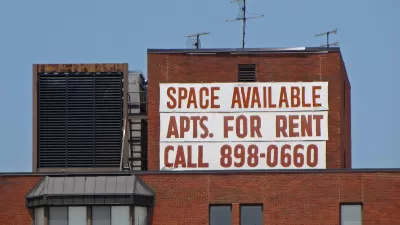While many places have eliminated their breed-specific bans, some counties hold on to outdated stereotypes that create additional challenges in an already tight housing market.

Dan Reed argues that breed-specific housing restrictions that ban dogs such as pit bulls ultimately constitute a housing issue. Despite public perception that "pit bulls"–which "can refer to several different breeds, including American Pit Bull Terrier, American Staffordshire Terrier, and Staffordshire Bull Terrier"–are "inherently dangerous," writes Reed, history shows "pit bull bans didn’t make communities safer." By now, "most jurisdictions in the [D.C.] region no longer have pit bull laws. Virginia bans breed-specific laws entirely." Yet Prince George's County continues to uphold its ban.
Reed reasserts that breed restrictions create unnecessary difficulties for renters like himself and his partner, who found themselves facing a list of 38 restricted breeds when renting an apartment in Montgomery County. Meanwhile, "'Pet-friendly' apartment complexes may still have restrictions and tend to be more expensive or charge extra in pet rent, putting them out of reach for many pet owners," and "insurance companies can deny or restrict your coverage if you have a pit bull." Reed advocates for the breeds, saying "misconceptions about pit bulls have real consequences for innocent dogs and their families."
FULL STORY: Pit bull bans are a housing issue

Alabama: Trump Terminates Settlements for Black Communities Harmed By Raw Sewage
Trump deemed the landmark civil rights agreement “illegal DEI and environmental justice policy.”

Planetizen Federal Action Tracker
A weekly monitor of how Trump’s orders and actions are impacting planners and planning in America.

The 120 Year Old Tiny Home Villages That Sheltered San Francisco’s Earthquake Refugees
More than a century ago, San Francisco mobilized to house thousands of residents displaced by the 1906 earthquake. Could their strategy offer a model for the present?

In Both Crashes and Crime, Public Transportation is Far Safer than Driving
Contrary to popular assumptions, public transportation has far lower crash and crime rates than automobile travel. For safer communities, improve and encourage transit travel.

Report: Zoning Reforms Should Complement Nashville’s Ambitious Transit Plan
Without reform, restrictive zoning codes will limit the impact of the city’s planned transit expansion and could exclude some of the residents who depend on transit the most.

Judge Orders Release of Frozen IRA, IIJA Funding
The decision is a victory for environmental groups who charged that freezing funds for critical infrastructure and disaster response programs caused “real and irreparable harm” to communities.
Urban Design for Planners 1: Software Tools
This six-course series explores essential urban design concepts using open source software and equips planners with the tools they need to participate fully in the urban design process.
Planning for Universal Design
Learn the tools for implementing Universal Design in planning regulations.
Clanton & Associates, Inc.
Jessamine County Fiscal Court
Institute for Housing and Urban Development Studies (IHS)
City of Grandview
Harvard GSD Executive Education
Toledo-Lucas County Plan Commissions
Salt Lake City
NYU Wagner Graduate School of Public Service





























